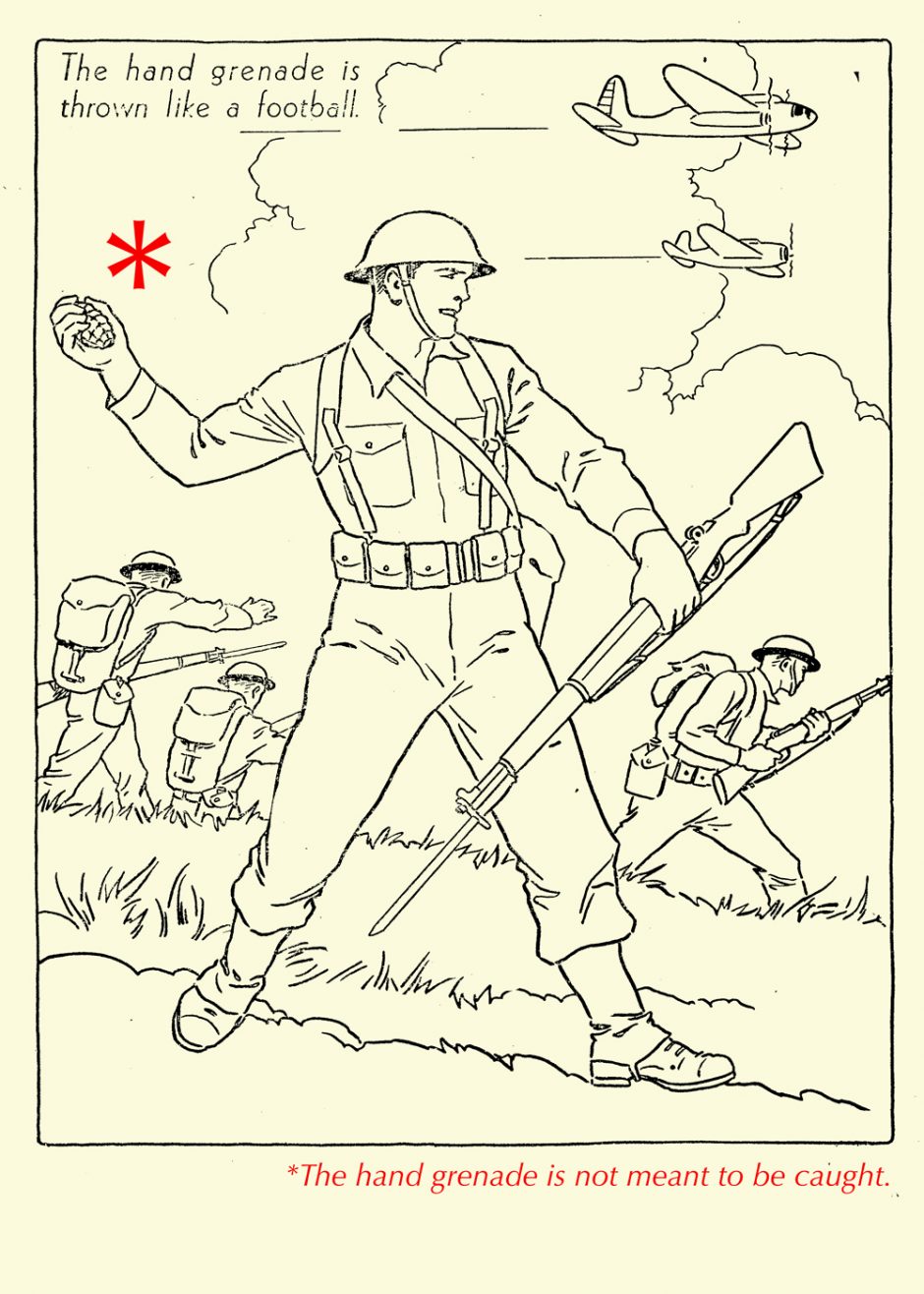America At War, Coloring Book, 1943, Broc Blegen
I‘ve been to the moon, and now they want to take away my office.
“I need it,” I say.
“Be honest, Dick,” says Leroy. “When was the last time you needed it?” It’s his job to manage the office space, and sometimes he gets kind of cocky about it.
I look him in the eye. “I need it for interviews.”
“Nobody’s interviewed you in ten years,” Leroy says.
“But they still might.”
“Why would they?”
Leroy has never been to the moon. I rise, shaking slightly from my arthritis, and turn to examine the poster on the wall. It shows an astronaut astride the Lunar Lander, saluting the rising Earth. It’s a nice picture, and a popular item in the gift shop. I took it myself.
“I took this picture,” I tell Leroy.
“Yes,” he says. “I know you did. It’s a nice picture.”
“It must make NASA a bundle in royalties every year.”
“It’s in public domain,” Leroy says. “We don’t get anything from it.”
“But the posters,” I say.
“Right. The posters. Big money-makers. Look, Dick…” He slouches in the chair to show me how confident he is, confident enough to slouch while in my office. “We need this office space. And what do you do with it?”
“I come in here to work on my book,” I say.
“Right,” Leroy says. “Your book. How long have you been working on it?”
“Twenty years.”
“Uh-huh. When’s it going to print?”
“I dunno. It’s not done yet.”
“There’s no reason you need to come here to work on it,” Leroy says. “You could work on it from home. Right?”
“I like it here,” I say. “It’s quiet. This has been my office since before the mission.”
“All right, Dick,” Leroy says. “I’ll be completely level with you. We can’t afford to keep you in here any longer. We need the office, and since you’re not benefiting NASA in any way. . .”
“I’m not costing anything, either.”
“You’re costing us a perfectly good office. Be reasonable, Dick. You’re, what, seventy-five? What do you need it for?”
“I’m seventy-four,” I correct him. My birthday’s not ’til next month. “I need the office to work on my book.”
“You could just as easily work on it at home. Or at the public library, for that matter. All you need is a keyboard.”
“I need to be comfortable,” I say. “I wouldn’t be comfortable working at the library. I can’t work just anywhere.” I pick up the latest page and show it to him. He leans backward as if magnetically repelled. “The ground aglow,” I read aloud, “the dust like powdered stars, / I stand upon this lunar soil lone. / Above, the Earth, so glowing in its bed / of onyx cold and pinpricks glowing—”
“Yes, I’ve read it before,” Leroy interrupts.
“But I just wrote it.”
“Look, Dick,” he says, smiling sadly, “It’s a nice idea. A book of lunar poetry. But who’s going to read it?”
“People have always written poetry about the moon,” I say. “But I’ve actually been there.”
“That doesn’t make you a poetry expert,” he says. “You can’t just decide to be a poet.”
“But I am a poet.”
“Look, Dick,” he says again. “We need the office space.”
“What do you need it for?” I ask.
“We still have astronauts, you know. Astronauts who still fly. They need offices, too.”
I consider this.
“We’ve got three new guys—well, one of them’s a girl—woman—and we need to set them up somewhere.”
“What kind of missions do they fly?”
He blinks as if he doesn’t understand the question. “Shuttle missions. You know, to the ISS?”
“I’ve been to the moon,” I say.
Leroy sighs and gets up. “I know that. But you didn’t get up there under your own power. We sent you. We did you a favor. Now maybe you could do us a favor. Think about it?” He turns and leaves.
The door closes. I say aloud, “You didn’t send me anywhere. You were six then.”
I reach for my inbox, but it’s empty. So is the outbox.
But it’s four o’clock anyway, so I decide to go home for the day. In the lobby a little boy is examining the lunar lander through the smeared glass. I join in, mentally labeling all the little parts, starting with the most obscure. He looks up at me.
“You know,” I said, “I’ve been there.”
He looks at me quizzically. “To the moon?”
I nod.
He looks away. “No, you haven’t, mister,” he says, then he puts his little hands in his pockets and walks away.
About the Artist
Broc Blegen, University of Minnesota
Broc Blegen, of the University of Minnesota, can be reached at [email protected].

No Comments